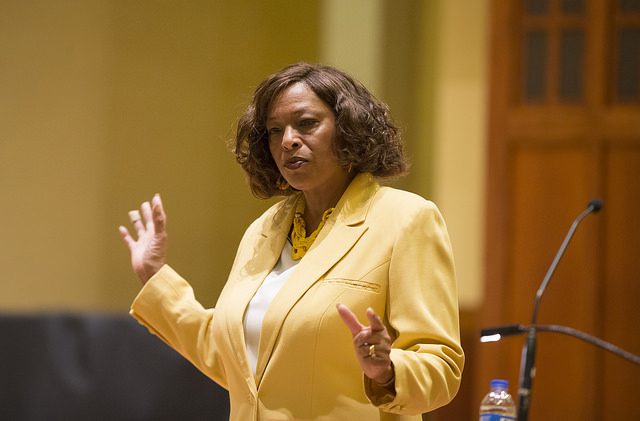“Everything comes from love”

Lillian Brock Flemming, a 1971 graduate of Furman University and one of the early African-American students at the school, was the speaker at the L.D. Johnson lecture on “What Really Matters?”
Flemming’s talk was part of Furman’s year-long celebration of the 50th anniversary of the desegregation of the university. Joseph Vaughn, a Greenville resident, was the first black student to attend Furman. Flemming was one of the first female African-American students on campus and was awarded an honorary doctorate of humanities earlier this year by Furman.
The events commemorating Furman’s desegregation tell the story of the university’s desegregation journey, said Maria Swearengen, assistant university chaplain. Introducing Flemming as an educator, activist and Greenville City Council member, Swearengen said that integration “is far from complete.”
Vaughn Crowetipton, associate vice president for spiritual life, said the lecture series honors L.D. Johnson, Furman chaplain from 1967 to 1981. Johnson helped the university grapple with many important issues, he said.
Flemming’s answer to “What Really Matters?” is love.
“Sometimes we go through life and never look to the left or the right,” she said. “What really matters is different for every person. I think I learned most of what really mattered from my mom and daddy.”
Citing First Corinthians 13, she said, “Everything comes from love.” She advised those in the audience to be their brothers’ keeper, even when some of those brothers present challenges.
People need to worry most about their ability to love, she said, because “it’s real clear that everything we have centers around love. What’s important in your life is not how long you live; it’s the dash” between your birth and death.
One result of love is a positive attitude, she said. “You don’t waste a day by being negative. What my dad said to me was ‘Don’t let other people make you a trash can.’ Love helps you be positive. It helps you treat other people better than some of them deserve to be treated.”
Being positive makes hope and happiness possible, she said.
“If you have no hope, you do perish,” she said. “If you have no hope, you have no future.”
She admitted that as a pioneer desegregating Furman, she and the other students faced challenges. But the answer to that is to talk and get to know others. She said that while on campus, a Ku Klux Klan official came to speak on campus. The African-American students decided to attend. But they didn’t have to say anything because white students on the front row “decimated” the man. They were not hearing his hateful speech.
She told students in the audience that they often spend too much time on electronic gadgets and don’t really talk to others. Young people need to get to know each other, to know their middle names and what their favorite colors are.
Mentioning the media’s treatment of Richard Jewell, a security guard who was suggested as being involved in the Centennial Olympic Park bombing at the 1996 Olympic games in Atlanta and was later exonerated, she said he was accused without facts.
“That’s what our society has done because we don’t talk to each other,” she said. “We don’t get the facts. We don’t trust one another because we don’t talk. “
When we talk to others who are different from us, “we find out we have more in common than we don’t have in common. We find out we want the same things,” she said.
When asked how she remains positive on bad days, Flemming said, “I pray.”
She also said that diversity can be improved by giving information to everyone. People need to go into communities different from their own and create relationships and partnerships. While at Furman, she talked with other black students and got to know them. But they also worked to get people who were not black to know that all black people are not alike. They enjoy different types of music; they have different beliefs; they look and dress differently.
Racism is still alive and well, she said, and some attitudes and actions have not changed much from the 1960s. But “What people think of you does not have to be true. It’s what you think about yourself.”
The major way of combating prejudice and discrimination is to “continue to talk. Don’t let stereotypes make you form judgments until you know somebody.” She also encouraged parents to model tolerance for their children and talk with them about how they would feel if intolerance were directed toward them.
“Most people don’t want to hurt others. Most people do care,” she said, adding they often say what the crowd is saying without thinking about it could affect others.